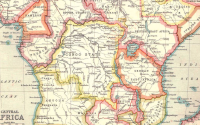Fernand Braudel Center, Binghamton Universityhttp://fbc.binghamton.edu/commentr.htmCommentary No. 115, June 15, 2003
President Bush launched the "road map" to peace in Israel/Palestine in Aqaba this month, and within days the road map seemed to be in tatters. There is an old Chinese saying that "if you don't know where you're going, all roads lead there." The Bush administration officially, and probably unofficially, has not the slightest idea were it's going. The official U.S. line is that it is trying to facilitate negotiations, and will accept whatever is acceptable to both sides. The U.S. claims it is merely trying to lay down the necessary steps that will lead both sides to final and definitive negotiations.
President Bush has said for two years that he didn't want to engage himself personally in such negotiations, something President Clinton had done extensively (as had President Carter). But now he has done it. Why? Perhaps merely because he had promised a lot of people that, once Iraq was conquered, he would do something significant. He had promised Blair. He had promised the so-called moderate Arab leaders. And he had probably promised Powell.
To call the first meeting, he counted on two things. The Palestine Authority officials are desperate to achieve something, almost anything. Otherwise they are history. Sharon is anxious to keep the United States 99% on his side, and thus had to make gestures. So they met, made absolutely minimal steps towards each other, went home, and within days there was more violence than ever.
Let us be serious. Where is everyone 55 years after the creation of the State of Israel? The Palestinians are feeling abandoned by the world, and incapable to wrenching any concessions of consequence from the Israeli government. A sovereign Palestinian state, they fear, is simply not on the horizon in the coming decade. Those who stand for unmitigated struggle and the elimination of the State of Israel - Hamas for example - are coming to be the only important players on the scene. No doubt a majority of Palestinians would prefer an end to violence, but most of them don't believe they will get anywhere politically if they do end their violence.
This gloomy assessment is matched on the Israeli side. Polls show that perhaps 60% of the Jewish Israelis would give up the settlements and go back to the 1967 borders in exchange for permanent peace. But the same polls show that of this 60%, perhaps half or more no longer think such an offer would achieve the peace they want. And therefore, in practice, they are not ready to make the offer, or not ready any more.
It is quite clear that whenever Sharon or Abbas show the slightest inclination to adopt a compromise position (largely to please Bush), they face very strong, and quite passionate, opposition in their own community, opposition strong enough to derail even virtually meaningless compromises. Actually, the same is true of Bush. When he pulled back from 99% support of the Israeli position to 98%, he ran into a firestorm in the United States.
What we have is a situation in which not only the most intransigent forces on the Israeli side have the upper hand and the most intransigent forces on the Palestinian side have the upper hand, but the most intransigent pro-Israeli forces in the United States have the upper hand. Far from easing the situation, the U.S. conquest of Iraq has hardened the situation, as was easy to predict.
So we are at an absolute political stalemate. And fairly soon, everyone will admit it. What then? What follows is scarcely good news for anyone. The Israelis will use more and more force, and may start a process of expulsions. Since they have the power at the moment, they will prevail, in the sense that they will continue to occupy the entire area, and control it more or less under martial law. The Palestinians will continue to respond as they have been responding. In the short run, the intifada will change nothing. For such violence to change anything, there must be a responsive world out there, and there really isn't.
But then the Israel/Palestine struggle will blend into a pan-Arab or pan-Muslim series of disorders, from Morocco to Indonesia, and most pertinently and most immediately in Iraq, Lebanon, and Egypt. And when this happens, then the survival of the State of Israel will be in peril, truly in peril, for the first time since 1948. The Arabs will say that the Jews have been expelled from the area twice before, and they will make it a third time.
Can anyone do anything at this point that would really change such a scenario? Probably the United States still has the power to do something. But that would require such a 180-degree reversal of U.S. policy, and especially of the Bush version of this policy, that it is virtually unthinkable. For a reversal in this particular area could not occur without a reversal in so many other areas that it would represent an earthquake in geopolitical realities.
I was not always such a pessimist. In the late 1980s, I expected that a two-state accord not only was possible but would be reached. I remember predicting, quite incorrectly, that this would occur much before an end to the apartheid regime in South Africa could occur. The world has squandered the possibilities in Israel/Palestine. And most participants and observers are spending their energy these days pointing fingers at who is responsible. After the bloody debacle, will it matter? Is anyone listening, or thinking about it? Is everyone so certain they can prevail without fundamental change in their positions? They seem to be.






